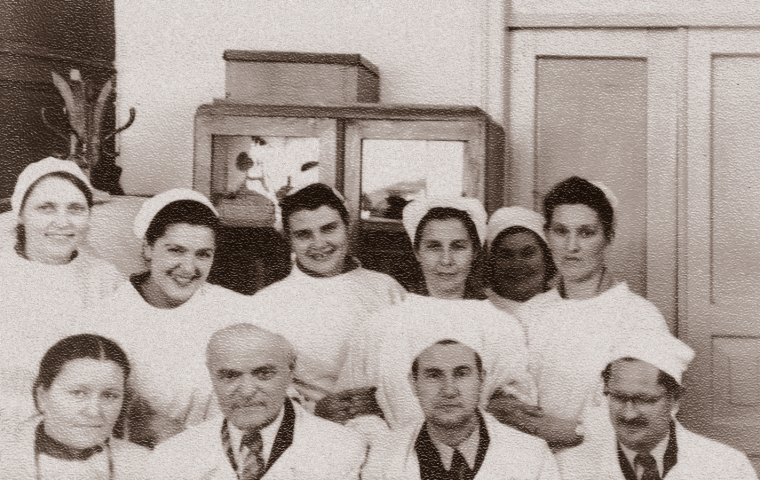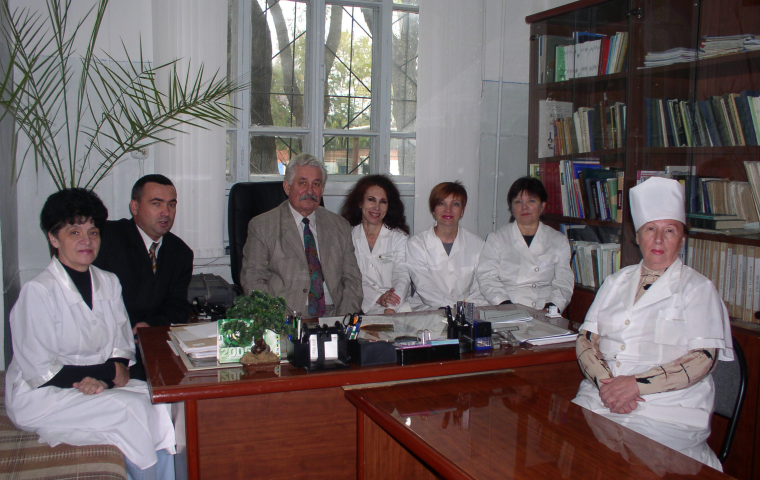Infectious diseases and phthisiopulmonology

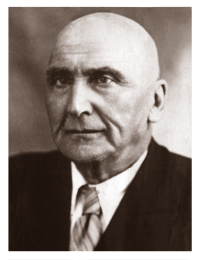
The Department of Infectious Diseases is one of the oldest clinical departments at the university.In 1920-1922.Lectures on the course of infectious diseases were given at the Department of Microbiology with a course of infectious diseases, and subsequently at the Department of Faculty Therapy.The teaching of infectious diseases required the expansion of the clinic of infectious diseases of the Kuban State Medical Institute, which was headed jointly from 1923 to 1927 by the head of the clinic, Professor Evgeniy Mikhailovich Zhadkevich, the senior assistant was Nikolai Voskanovich Kasparov, the assistant was Boris Melentyevich Efimov.During these years, a number of scientific studies were carried out on pressing problems of that time - typhoid fever, cholera.
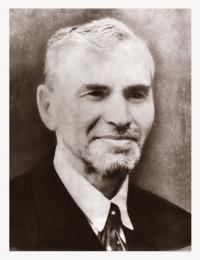
In 1928, on the basis of the city infectious diseases hospital of Krasnodar, an independent department of infectious diseases was organized, which was headed by Professor Grigory Stepanovich Demyanov for 30 years (1928-1958).During the difficult years of the war, on November 29, 1941, Kuban State Medical Institute named after.The Red Army was evacuated to Yerevan.Professor G.S. remained the head of the department during the evacuation.Demyanov, associate professor G.N.Kovalsky, assistants - E.D. Goldovsky, G.L.Arzamanov, S.M.Mon-velyan, V.S.Mikaelyan.In Krasnodar during this period, the Krasnodar branch of the Kuban State Medical Institute named after.Red Army, where the department of infectious diseases was headed by Boris Melentyevich Efimov, assistants: L.Ya.Kramorova, P.G.Kopylova.In March 1942, Professor G.S.Due to illness, Demyanov returned to Krasnodar and headed the department.In Yerevan, the acting head of the department was Efim Davidovich Goldovsky.April 30, 1942 Kuban State Medical Institute named after.The Red Army was reevacuated from Yerevan to Krasnodar, but on August 1, 1942, the institute was re-evacuated, first to Yerevan and then to Tyumen.Professor G.S.Due to illness, Demyanov was unable to evacuate from Krasnodar again, and from January to November 1943, the department in Tyumen was concurrently headed by Professor E.M.Zhadkevich.From March 1943 to November 1943, the liberation of Krasnodar from the Nazi invaders, Professor G.S.Demyanov headed the department of infectious diseases of the Krasnodar branch.And on November 8, 1943, after the return of the medical institute to Krasnodar from Tyumen, Professor G.S.Demyanov again became the head of the department of infectious diseases at the institute.In the post-war years, assistants A.S. worked at the department.Blazhnaya, A.V.Gordienko, L.Ya.Korchanova, A.P.Oleinik, M.T.Malina, in the 50s, the staff of the department were assistants T.V.Kuzmina I. Z.-M.Maslieva, N.V.Baranov, T.V.Nizovaya.
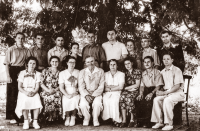
From the first years of the creation of the department, the work of its team was aimed at preventing the epidemic spread of severe infectious diseases - typhus and typhoid fever, acute intestinal infections, including cholera, as well as diphtheria, meningitis, tetanus and many others.The introduction of scientific developments in early diagnosis, treatment, and anti-epidemic measures has led to a decrease in the incidence and elimination of a number of infectious and parasitic diseases in the region, including cholera and malaria.Professor G.S. Demyanov (1885-1958) dealt with the treatment and prevention of malaria, typhoid fever, brucellosis, developed physiotherapy and climatic treatment for infectious diseases.He developed a method for intradermal vaccine therapy for brucellosis and proposed a method of “blind probing of the liver.”In the monograph “Pro-stud”, differentiated approaches to the diagnosis and treatment of this group of diseases were used for the first time.
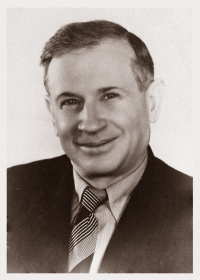
In 1941, an associate professor course in epidemiology was organized at the Department of Infectious Diseases, which was headed by associate professor Grigory Nikolaevich Kovalsky until 1982.With the name G.N.Kovalsky is associated with the formation of epidemiological science in Kuban: in the period from 1943 to 1952.he headed the Institute of Epidemiology in Krasnodar.Developed by G.N.Kowalski's anti-leptospirosis vaccine has found widespread use in practice, preventing diseases in many people.From 1982 to 1986, the epidemiology course was led by Associate Professor G.F.Klokov, from 1986 to 1992, S.N. was responsible for the epidemiology course.Strikhanov, from 1992 to 1996 – associate professor F.I.Larin.Over the years, epidemiology was carried out by assistants E.R.Bakhareva, L.N.Bratik, G.I.Gurbich.From 1958 to 1970, the Department of Infectious Diseases was headed by Doctor of Medical Sciences, Professor, Honored Scientist of Dagestan Alexey Grigorievich Podvarko (1896-1973), a graduate of the Kuban State Medical Institute (1927).
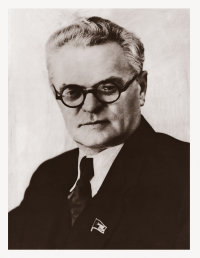
During this period, the assistants of the department were Yu.A.Amvrosiev, A.A.Astapov, V.V.Plahotnyu-kova.The contribution of A.G.Podvarko into the science of quarantine infections.Under his leadership, 6 candidate and 1 doctoral dissertations were completed.The main scientific interests of the department were devoted to the development of new methods for the treatment of malaria, typhoid fever, viral hepatitis, amebiasis, chronic colitis; the method of deep intestinal lavage was proposed and put into practice.Thanks to the work of Professor A.G.Podvarko, treatment of patients with brucellosis was organized in Dagestan and the Krasnodar region, and a complex of treatment for patients with tetanus was developed.In 1942, treatment of cholera patients was introduced into practice, which played a major role in eliminating two epidemics.
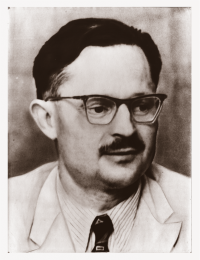
In the period from 1970 to 1974, the department was headed by a WWII participant, Professor Igor Borisovich Tsynkalovsky (1917-2000).Under his leadership, issues of diagnosis and treatment of viral hepatitis, typhoid fever, and dysentery were developed.The dynamics of the blood coagulation system in a number of infectious diseases were studied, the mechanisms of development of hemorrhagic syndrome in liver damage were revealed, and the principles of pathogenetic therapy of hepatic cell failure were substantiated.L.G. was hired as an assistant at the department.Golovko.From 1972 to 1982, the department taught a course on tropical diseases for foreign students, led by Associate Professor G.F.Klokova.
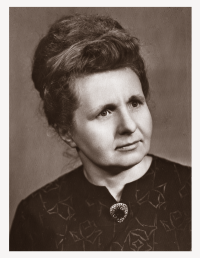
From 1974 to 1986, the department was headed by Associate Professor Nina Borisovna Primachenko (1923-2000).During this period, the department developed issues of diagnosis and treatment of intestinal infections - dysentery, salmonellosis.N.B.Primachenko laid the foundation for a detailed clinical study of leptospirosis, a severe natural focal infection of the Krasnodar region.The methods for diagnosing and treating leptospirosis and emergency conditions in the clinic of infectious diseases developed under her leadership are generally recognized.The following assistants worked at the department during this period: Blazhnaya L.P., Belyak G.M., Lebedev V.V., Leonova T.S., Morenets T.M., Motuzova T.N., Plakhotnyukova V.V., Strikhanova S.N.In 1986, the duties of the head of the department were performed by candidate of medical sciences, assistant Valentina Vasilievna Plakhotnyukova.
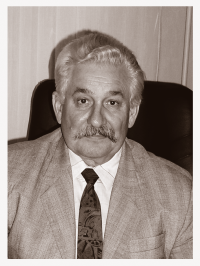
From 1986 to 2008, the Department of Infectious Diseases was headed by Professor Grigory Vasilievich Melnik (1940-2008).Avdeeva M.G., Andreev R.E., Zhukova L.I., Namitokov Kh.A. were hired as assistants.Professor G.V.Melnik from 1988 to 1992was the main infectious disease specialist in the Krasnodar region.His works examined the issues of diagnosis and treatment of generalized meningococcal infection, erysipelas, opisthorchiasis, and clarified a number of issues regarding the pathogenesis of viral hepatitis and leptospirosis.G.V. Melnik organized research for HIV infection for the first time in the Krasnodar region.Based on the results of the scientific topic he led on the problem of leptospirosis, 2 doctoral and four candidate dissertations were defended, 190 scientific papers, 9 copyright certificates for invention were published, 15 teaching aids were published.
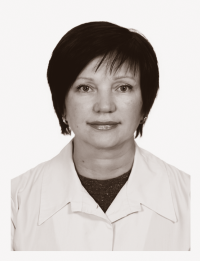
In 2008-2010, the department was headed by Doctor of Medical Sciences, Professor Larisa Ivanovna Zhukova.Results of scientific research by Zhukova L.I.made it possible to clarify the pathogenesis of hepatorenal disorders and the formation of icteric forms in leptospirosis, to improve the diagnosis and treatment of diphtheria and erysipelas.During this period, 8 educational and methodological manuals were published, 2 patents were received, 4 candidate's dissertations were defended.
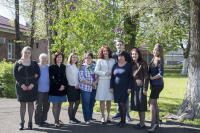
In 2010, after merging with the Department of Phthisiopulmonology, the
Department of Infectious Diseases and Phthisiopulmonology was established.
Tuberculosis was taught at the faculty's Department of Therapy until the 1930s. In 1943, after returning from Tyumen, a course on pulmonary tuberculosis was established at this department under the guidance of Professor A.L. Samoilovich. In 1951, the course was headed by Associate Professor A.I. Petrovykh. Then the course was led by associate professor A.I. Goreslavskaya. The history of separate teaching of phthisiology at the university begins with the tuberculosis course (1967), which was reorganized into a department (1974), and then integrated with pulmonology. Anatoly Mikhailovich Kovalenko, Doctor of Medical Sciences, became the first head, followed by Vasily Vasilyevich Kolesnikov, Doctor of Medical Sciences. From 1983 to 2009, the department was headed by the Doctor of Medical Sciences, Professor Alla Evgenievna Doroshenkova. Under her leadership, 10 PhD and 5 doctoral dissertations were defended, 215 scientific papers on various issues of phthisio-pulmonology were published. From 2009 to 2010, the Department of Phthisiopulmonology was headed by Dr. Med.Sciences Irina Yurievna Babayeva. Irina Yurievna's research interests include disseminated and infiltrative tuberculosis in patients with HIV infection, problems and ways to optimize the detection and diagnosis of viral hepatitis in patients with tuberculosis. The staff of the Department of Phthisiopulmonology has published about 600 scientific articles, 4 certificates of invention have been obtained.
Since 2010, the Department of Infectious Diseases and Phthisiopulmonology has been headed by Doctor of Medical Sciences, Professor Marina Gennadievna Avdeeva. She has defended 6 PhD theses under her leadership. M.G. Avdeeva is the author of 370 published scientific papers, including 7 monographs, 25 teaching aids, co-author of the National Guidelines on Infectious Diseases, holds 1 copyright certificate and 7 patents for inventions.
Throughout the years, the scientific school of infectious diseases and phthisiology, prepared by the department, has been making a significant contribution to the formation of the scientific and practical medical potential of Kuban. From 1986 to 2019, the staff of the Department and the Infectious Diseases Hospital completed and defended their PhD theses on the most pressing problems of ubiquitous and regional pathology. Krasnodar: Lebedev V.V., Leonova T.S., Belyak G.M., Avdeeva M.G., Piskunov O.V., Degtyar L.D., Moisova D.L., Andreev R.E., Tarasova L.S., Ko-vtun E.A., Konchakova A.A., Bondarenko I.N., Strikhanova O.V., Vanyukov A.A., Manaeva D.A., Hurum Z.Yu., Trisko A.A., Moshkova D.Yu., doctoral dissertations – Melnik G.V., Avdeeva M.G., Zhukova L.I., Babaeva I.Yu., Stavitskaya N.V.
Currently, the Department of Infectious Diseases is taught by: PhD, Associate professors L.P. Blazhnyaya, M.I. Kulbuzheva, A.A. Konchakova, D.Y. Moshkova.. assistants: Ganzha A.A., Candidate of Medical Sciences Trisko A.A., phthisiopulmonology: Doctor of Medical Sciences I.Y. Babayeva, Associate Professor, Candidate of Medical Sciences Shevchenko A.I., assistants Baida M.A., Vavilova E.P., Dudchenko D.V., Tavolzhanskaya V.V., Shevchenko N.N., Yatsukova A.V..
The main activity of the department is represented by educational and methodical work. The staff of the department carry out active medical work, provide supervision and consultation of clinically complex patients in the basic regional clinical specialized infectious diseases hospital and a tuberculosis dispensary, review medical documentation, and are experts of the Roszdravnadzor of the Ministry of Health of the Russian Federation.
